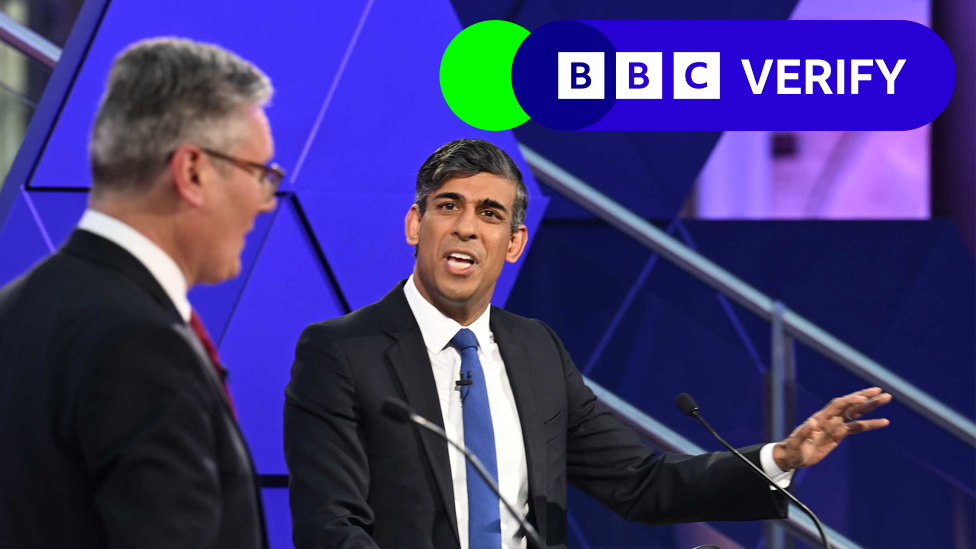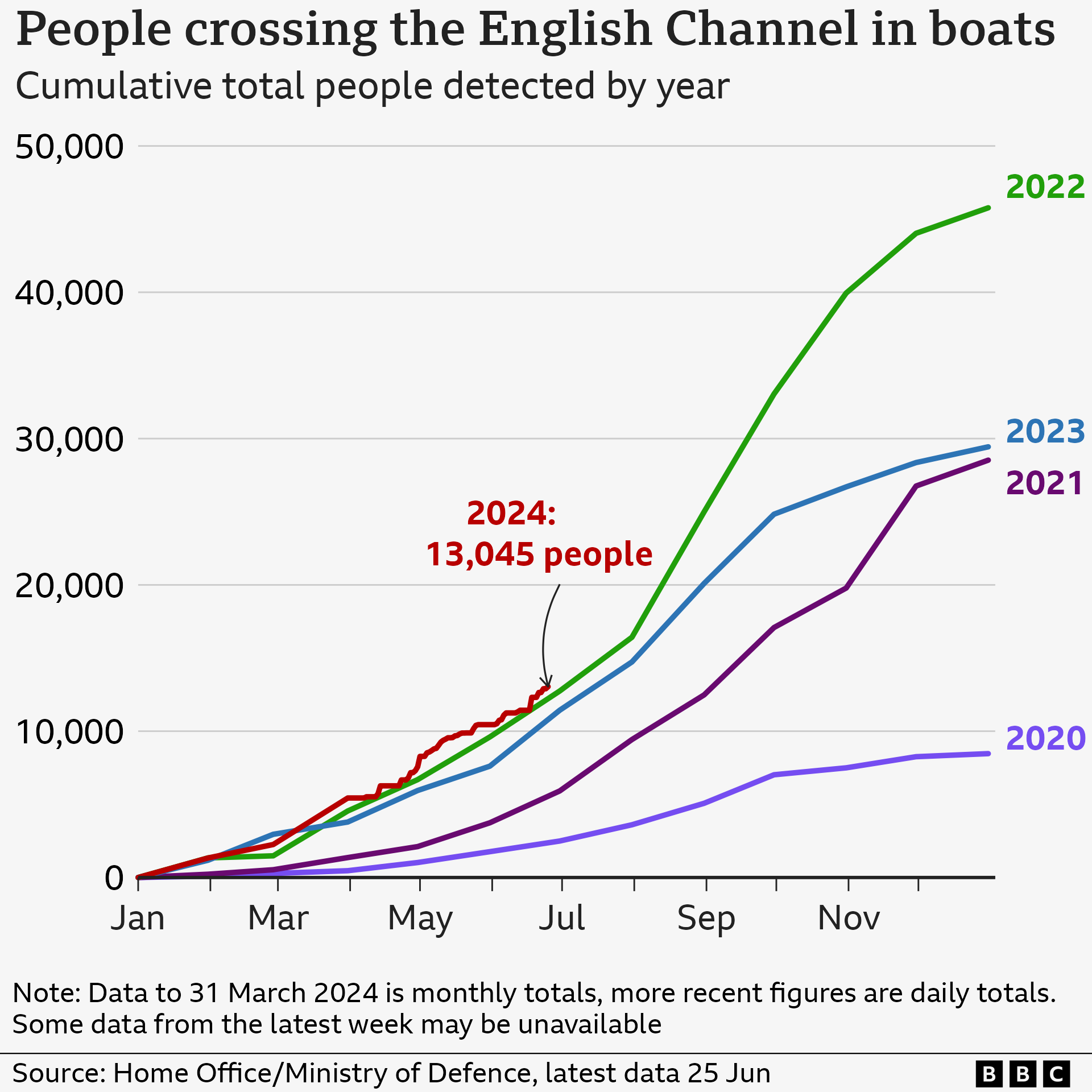Retirement tax, net zero, small boats - BBC Verify tests key claims

- Published
Rishi Sunak and Keir Starmer have taken questions from a BBC audience in their final head-to-head debate before polling day.
They traded claims on immigration, tax and net zero policies. BBC Verify has been examining their claims.
Will Labour bring in a retirement tax?
Rishi Sunak said under a future Labour government “the state pension will be subject to a retirement tax”.
Pensioners relying solely on the state pension are on course to potentially pay a small amount of income tax in 2027-28, because the state pension in that year (£12,578) is forecast to marginally overtake the tax-free personal allowance (£12,570).
The Conservative triple lock plus policy - which raises the personal allowance for pensioners to £13,710 by 2027-28 - would remove that risk.
Labour hasn’t said yet whether they would match it or not. But note, the Conservatives only unveiled the policy within the last couple of weeks, so to present this as a planned Labour tax rise is a bit disingenuous.
And bear in mind that the Conservatives’ triple lock plus would only save someone living solely on the state pension about £29 a year.
Furthermore, some people are already paying tax on part of their state pension.
Analysis by former Lib Dem pensions minister Steve Webb, who works for an actuary firm, also suggests that around 2.5m pensioners (one in five of the total) are currently paying income tax on their state pension and would still be even if the triple lock plus were introduced.
That's because many people receive additional state pension payments due to their participation in the State Earnings Related Pension Scheme (SERPS).
By Ben Chu
Have 50,000 people crossed the Channel under Sunak?
Keir Starmer said: "Since Rishi Sunak became prime minister 50,000 people have come across by small boats."
He is right about that.
The Home Office publishes figures, external - going back to 2018 - for people detected crossing the English Channel in small boats. The exact number detected since Rishi Sunak became prime minister on 25 October 2022 is 50,108.
The highest figure recorded in a single year was in 2022, when 45,755 arrived this way.
Last year, 29,437 people were detected arriving in small boats – down a third on the year before.
In the last 12 calendar months, 31,204 people have been detected crossing, which is down 30% on the previous 12 months.
However, so far this year 13,045 have been detected, which is up about 16% from the same period last year and is a record.
By Anthony Reuben

Will Labour's net zero plans cost hundreds of billions?
Rishi Sunak said: "We've just found a recording that they have put out there from the deputy chancellor from the Labour Party admitting that their plans will cost hundreds of billions of pounds.”
The prime minister was making a reference to a Daily Telegraph story, external about Darren Jones, the shadow chief secretary to the Treasury, who was quoted as saying Labour’s net zero plans would cost “hundreds of billions” of pounds.
But this figure is consistent with existing estimates for reaching net zero greenhouse gas emissions by 2050, which is enshrined in law and also Conservative policy.
The UK’s independent Office of Budget Responsibility (OBR) reported back in 2021, external that reaching net zero by 2050 would require around £1.3 trillion of investment.
But the OBR also said that this would bring savings of around £1 trillion from moving away from fossil fuels – meaning a much lower net cost.
The bulk of the investment costs are expected to be met by the private sector rather than direct government spending. In the audio clip published by the Telegraph, Jones did not specify direct government spending.
By Mark Poynting
Is Labour’s manifesto fully funded and costed?
Keir Starmer referred to Labour’s manifesto as “fully funded, fully costed”.
But in its analysis of manifestos earlier in the week, independent think tank the Institute for Fiscal Studies (IFS) said that it was suspicious of claims that they were fully funded, particularly on promises to reduce NHS waiting times.
“You can’t pledge to end all waits of more than 18 weeks, allocate no money to that pledge, and then claim to have a fully costed manifesto,” IFS director Paul Johnson said.
He also said that the Conservatives’ commitments to the NHS “are essentially unfunded”.
By Anthony Reuben
Would Labour put taxes up by £2,000 per family?
Rishi Sunak asked “can you afford to pay at least £2,000 more in tax?”, claiming that’s what people would be asked to do by a Labour government.
The figure risks misleading people, not least because it consists of £500 a year extra for four years. That is not what you would normally think of if somebody said your taxes were going up by £2,000.
The Tories reached the figure by adding up how much they claim Labour’s spending plans would cost - £38.5bn over four years - and dividing this by the number of UK households with at least one person working. Labour disputes the figure.
The Conservatives say the costings were worked out by impartial civil servants, but some are based on assumptions made by politically appointed special advisers.
For example, one costing looks at Labour’s plan to have more services provided by the state instead of by private companies and it assumes that private companies are always 7.5% more efficient. But the civil servants doing the costings warned about the use of that figure. Read more here.
By Anthony Reuben
Are people still paying the price of Liz Truss’s unfunded tax cuts?
Keir Starmer said the Conservatives are planning “unfunded tax cuts”, adding that ex-prime minister Liz Truss had tried that experiment. He said “people are still paying the price” and they were “paying hundreds of pounds more because of the damage done to the economy”.
It is true that there was a spike in mortgage rates after the mini-budget - which included unfunded tax cuts, during Truss’s short-lived premiership.
But mortgage rates had been rising before the mini-budget, as the Bank of England put up interest rates to fight inflation, which began rising after the pandemic and the war in Ukraine. The spike faded away early in 2023.
The Bank of England governor said last January that the effect of the mini-budget had “pretty much gone” from interest rates.
But anyone who did take out a fixed-rate mortgage shortly after it may have signed up to a higher interest rate than they otherwise would have.
By Ben King
